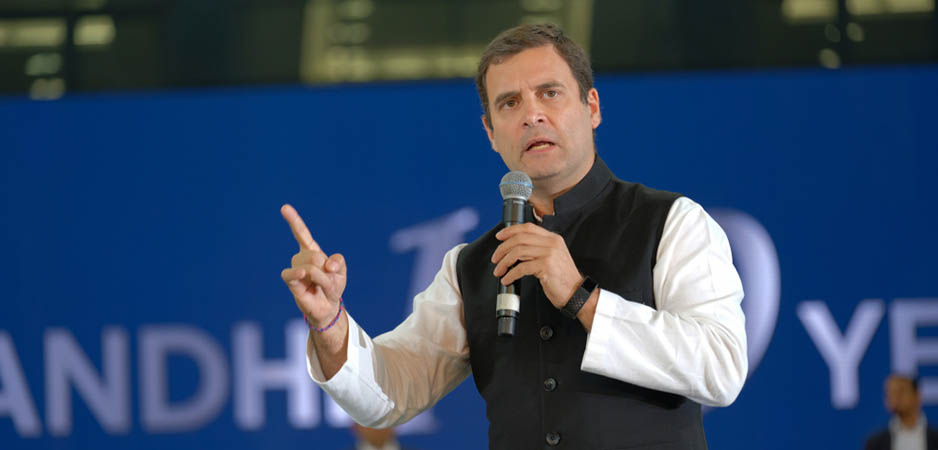As India goes to the polls, its opposition party is proposing a policy that threatens the unity of the country.
All political parties bring out manifestoes before elections. Think of them as love letters to the electorate that tell citizens about the person wooing them. In India’s ongoing national election, the manifesto of the Indian National Congress tells us a lot about this party.
The proposed policy of the Congress manifesto on Jammu and Kashmir is oblivious to the harsh realities of the state. Section 37 on page 41 spells out the party’s promises for the region: “an innovative federal solution.” Interestingly, the party does not tell us what this solution would be.
The mention of Jammu and Kashmir raises a key question: Why does a state find a special reference in the manifesto of the Indian opposition? No other state achieves this honor, including the turbulent northeastern ones. They are all conveniently bunched under section 38. The Congress party’s manifesto proposes a solution to a complicated problem it created and, therefore, deserves detailed examination.
IS THE CONGRESS SOLUTION REAL?
The party’s manifesto makes a sweetly reasonable declaration: “[D]ialogue is the only way to understand the aspirations of the people of the 3 regions of Jammu & Kashmir and find an honourable solution to their issues.”
Such a declaration begs a simple question: Who does India have a dialogue with? Is the answer Pakistan? Is the answer China? Is the answer the US? Or is it Saudi Arabia?
The promise of dialogue forgets one simple fact. The state of Jammu and Kashmir comprises three administrative divisions: Hindu-dominated Jammu, Muslim-majority Kashmir and the Buddhist Ladakh. Only the Kashmir Valley is a theater of conflict. It comprises merely 10 out of 22 districts of Jammu and Kashmir. In fact, the violence in Kashmir is causing Jammu and Ladakh much distress. Political power in Jammu and Kashmir is monopolized by politicians of the Kashmir Valley. And national politicians give scant attention to Jammu and Ladakh because they are peaceful.
When proposing dialogue, the Congress fails to spell out whom will it talk to. Will it include citizens of Jammu and Ladakh? How will the party select whom it will talk to? And, after ethnic cleansing of Kashmiri Pandits, growing radicalization in Kashmir Valley and the decimation of civil society, which Kashmiris will the Congress talk to?
REVIEWING THE TROOPS DEPLOYMENT
The Congress manifesto has promised “to review the deployment of armed forces, move more troops to the border to stop infiltration completely, reduce the presence of the Army and CAPFs [Indian paramilitary forces called Central Armed Police Forces] in the Kashmir Valley, and entrust more responsibility to the J&K police for maintaining law and order.”
First, the Congress is naive to believe that borders can be sanitized just by moving more troops to the border. Already, the Indian army has reduced infiltration through concerted use of improved technology and tactical troop deployment. Yet Pakistan remains committed to its long-term strategy of inflicting on India “death by a thousand cuts.” The Congress party is lying when it promises to stop infiltration completely. That cannot and will not happen.
Second, to reduce military and paramilitary presence is likely to cause much strain on the local police. The local police answers to the state government, which currently stands dismissed. The state of Jammu and Kashmir is under president’s rule, the direct administration of New Delhi. Tomorrow, it will be under the elected chief minister because law and order is a state subject. They are not likely to have the funding or training to fight an increasingly bloody proxy war.
Recently, Operation All Out — launched by the Indian army in coordination with the CAPFs, intelligence agencies, Rashtriya Rifles and the police — has been a tremendous success. It turns out that anti-militancy operations in 2018 achieved the best results over the last 10 years. According to Lieutenant General Ranbir Singh, “250 terrorists were killed, nearly 54 arrested and four surrendered.” These results give hope for peace, but the Congress manifesto threatens that possibility.
Of course, eliminating known terrorists has been partially negated by new ones joining the ranks. Adil Ahmad Dar, a local youth, was responsible for the suicide attack at Pulwama in February, which triggered the latest bout of Indo-Pakistani tensions. Pakistan’s Inter-Services Intelligence has used propaganda and psychological operations to trigger “a discernible rise in the levels of radicalisation and violent extremism.”
 Such is the state of affairs that respected foreign policy analyst Brahma Chellaney concludes that “Pakistan’s terror-centred warfare has proved costlier for India than any past war on the country.” For Pakistan, this is payback for 1971 when India defeated its neighbor and helped Bangladesh declare independence from Pakistan. It turns out that support of terrorism also pays. No one, especially the US, wants Pakistan to implode and terrorists getting their hands on nukes. As Chellaney states, “sponsoring cross-border terrorism pays.”
Such is the state of affairs that respected foreign policy analyst Brahma Chellaney concludes that “Pakistan’s terror-centred warfare has proved costlier for India than any past war on the country.” For Pakistan, this is payback for 1971 when India defeated its neighbor and helped Bangladesh declare independence from Pakistan. It turns out that support of terrorism also pays. No one, especially the US, wants Pakistan to implode and terrorists getting their hands on nukes. As Chellaney states, “sponsoring cross-border terrorism pays.”
The Congress manifesto fails to take into account the role of Pakistan. If India lowers its troop presence, proxies of Pakistan will increase. Terrorism will rise. More people will die. Sadly, the manifesto’s pious homilies fall flat in the face of harsh geopolitics, religious radicalization and grassroot realities.
PLAYING FAST AND LOOSE WITH THE LAW
The Congress manifesto states, “The Armed Forces (Special Powers) Act and the Disturbed Areas Act in J&K will be reviewed.” This act, popularly known as AFSPA, has become a beating stick for the security forces. People assume that AFSPA allows security forces to get away with murder. The reality is that AFSPA is simply an act that allows the army to arrest, open fire in self-defense and carry out search operations without reference to the civil authorities.
However there are safeguards. The army has to hand over every person it arrests under AFSPA within 24 hours to the local police. There are other safeguards to check abuse. In general, AFSPA is a much-needed legislation that allows the army to function without its hands totally tied. In any case, the Indian army does not have the freedom of other militaries. The US, the UK and even Pakistan give their troops far greater legal protections when sending them into combat. Were it not for such protections, US Navy SEALs could not have killed Osama bin Laden or Abu Musab al-Zarqawi.
In addition to the AFSPA point in the manifesto, veteran Congress politician P. Chidambaram has talked of amending AFSPA by “balancing the rights of security forces, as well as human rights and remove immunity only in three cases, enforced disappearance, sexual violence, and torture.”
Prima facie, this seems entirely reasonable. Yet there is more to it than meets the eye. As a clever politician, Chidambaram is insinuating that the Indian army gets away with murder, rape and torture right now. The reality is that the army is not exempt from the Indian Penal Code and numerous other laws. India’s National Human Rights Commission is no pushover and it registered 82,006 cases in 2017. All security forces in the country fall under its purview.
The Congress manifesto doubles down on Article 370 and Article 35A, two rather controversial aspects of the status quo. The former gives special legal status to Jammu and Kashmir, while the latter gives the state legislature “a carte blanche to decide who …are ‘permanent residents’ of the State and confer on them special rights and privileges in public sector jobs, acquisition of property in the State, scholarships and other public aid and welfare.” This has allowed the more populated Kashmir Valley to lord over Jammu and Ladakh. Politicians from the valley deny refugees from the partition of 1947 permanent status and create a monolithic culture that Shia Muslims, Hindus, Buddhists, atheists and agnostics find deeply disturbing.
The manifesto also posits “a large-hearted approach that will eschew muscular militarism and legalistic formulations and look for an innovative federal solution.” One wonders what that federal solution might be. The manifesto also promises “talks without preconditions.” Does that mean talking to jihadist groups? Is ceding Jammu and Kashmir or the Kashmir Valley to Pakistan on the agenda? And is the Congress party willing to talk about azadi (independence) for Kashmir?
The views expressed in this article are the author’s own and do not necessarily reflect Fair Observer’s editorial policy.
Support Fair Observer
We rely on your support for our independence, diversity and quality.
For more than 10 years, Fair Observer has been free, fair and independent. No billionaire owns us, no advertisers control us. We are a reader-supported nonprofit. Unlike many other publications, we keep our content free for readers regardless of where they live or whether they can afford to pay. We have no paywalls and no ads.
In the post-truth era of fake news, echo chambers and filter bubbles, we publish a plurality of perspectives from around the world. Anyone can publish with us, but everyone goes through a rigorous editorial process. So, you get fact-checked, well-reasoned content instead of noise.
We publish 3,000+ voices from 90+ countries. We also conduct education and training programs
on subjects ranging from digital media and journalism to writing and critical thinking. This
doesn’t come cheap. Servers, editors, trainers and web developers cost
money.
Please consider supporting us on a regular basis as a recurring donor or a
sustaining member.
Will you support FO’s journalism?
We rely on your support for our independence, diversity and quality.








Commenting Guidelines
Please read our commenting guidelines before commenting.
1. Be Respectful: Please be polite to the author. Avoid hostility. The whole point of Fair Observer is openness to different perspectives from perspectives from around the world.
2. Comment Thoughtfully: Please be relevant and constructive. We do not allow personal attacks, disinformation or trolling. We will remove hate speech or incitement.
3. Contribute Usefully: Add something of value — a point of view, an argument, a personal experience or a relevant link if you are citing statistics and key facts.
Please agree to the guidelines before proceeding.